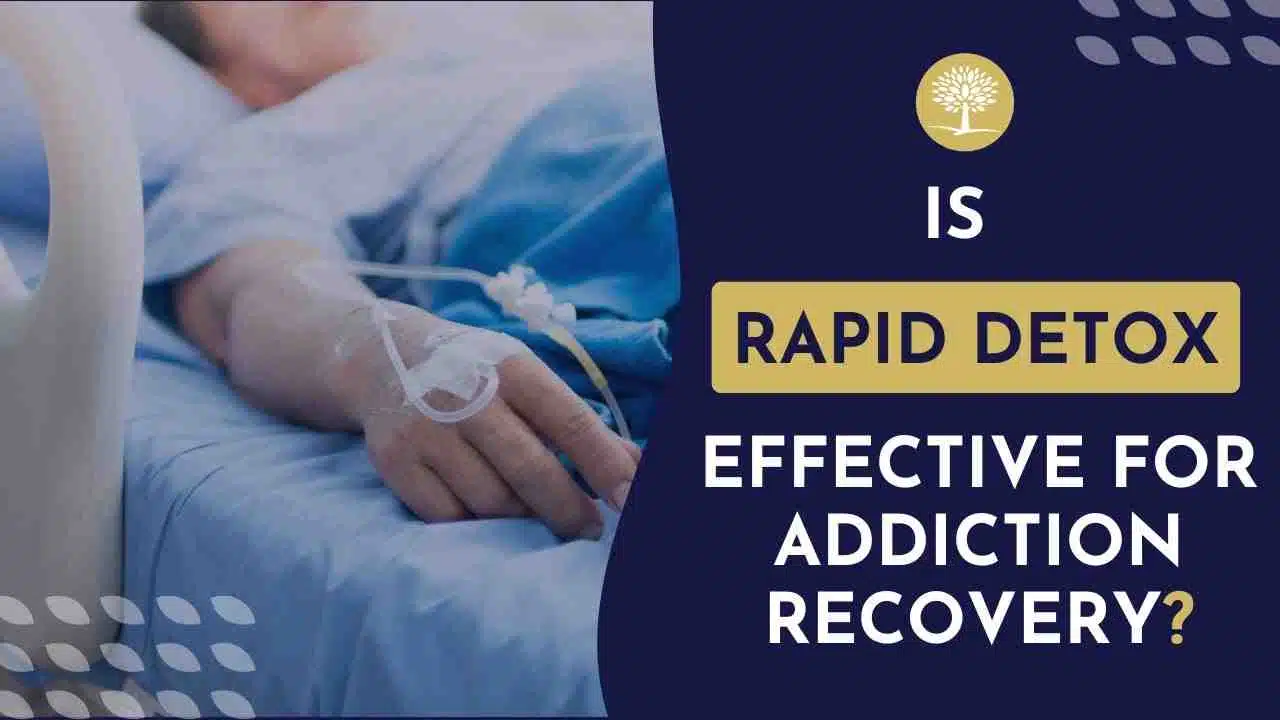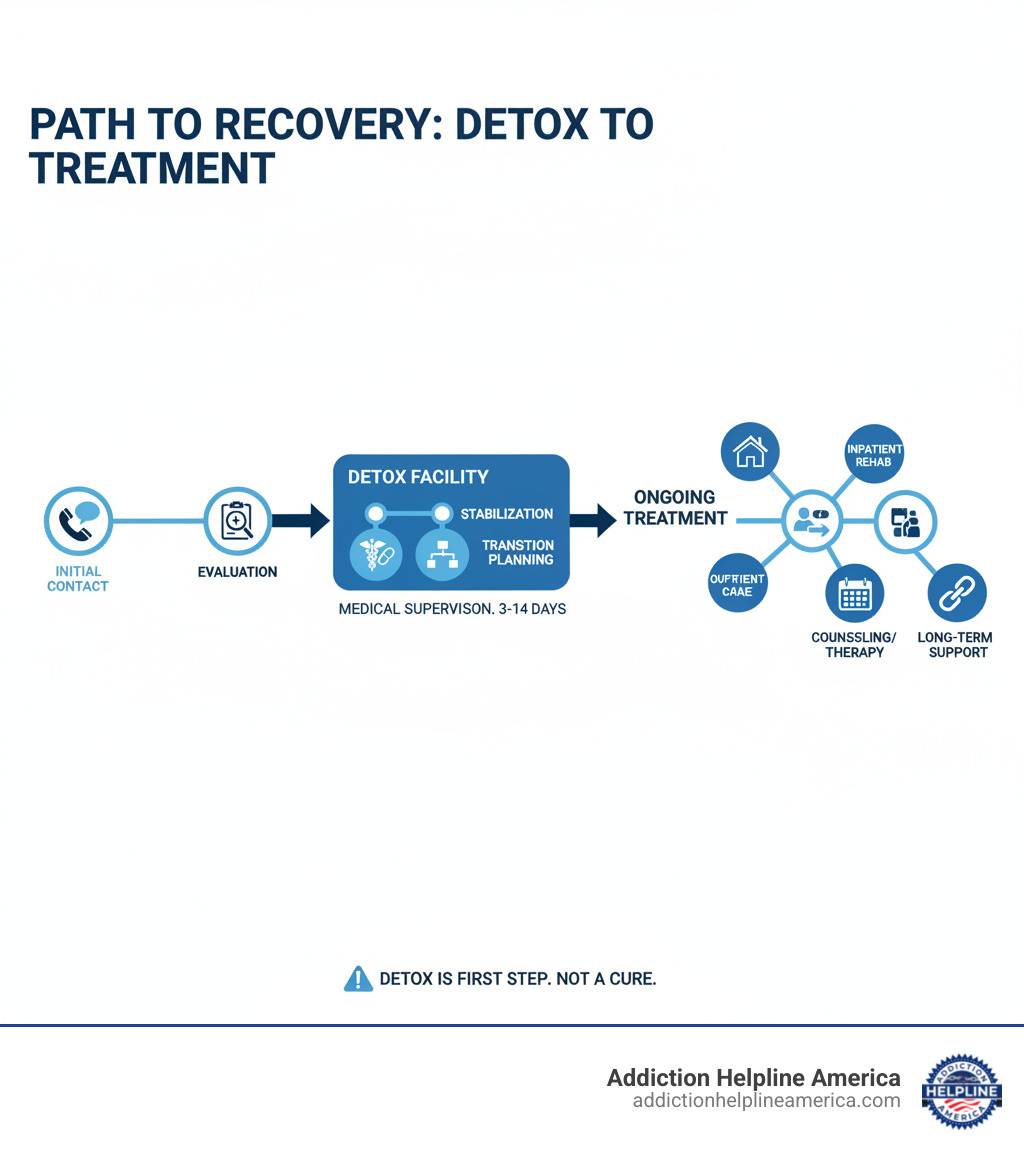
Why Medical Detoxification is the Critical First Step to Recovery
A detox facility is a specialized treatment center providing medically supervised withdrawal management. It’s the essential first step that prepares your body and mind for the real work of recovery, but it is not a cure for addiction.
Detoxification is the process of clearing substances from your body while managing withdrawal symptoms. Attempting this at home can be dangerous and potentially deadly, especially with alcohol and benzodiazepines, which can cause seizures and other life-threatening complications. Professional facilities provide the medical supervision, medications, and support needed to get through withdrawal safely.
Key Features of a Detox Facility:
- 24/7 medical monitoring to ensure safety.
- Medication-assisted treatment to manage symptoms.
- Professional staff including doctors, nurses, and addiction specialists.
- Safe, substance-free environment to prevent relapse.
- Connection to ongoing treatment for long-term recovery.
Detox typically involves three stages: evaluation of your health and substance use history; stabilization using medication and support to manage withdrawal; and preparation for the next phase of treatment. The length of detox varies by substance, usage history, and individual health, but it is only the beginning. To maintain sobriety, you must address the underlying causes of addiction through comprehensive treatment.
At Addiction Helpline America, we connect people with the detox facilities and treatment programs they need. We provide confidential, 24/7 guidance to help you take that critical first step.
Detox facility helpful reading:
Understanding the Detox Process
Understanding what happens during detox can ease fears about starting the journey to recovery. It’s the bridge from active addiction to a healthier life.
Recognizing the Need for Professional Detox
If you’ve tried to stop using drugs or alcohol and experienced frightening withdrawal symptoms, or if substance use has taken priority over your life, it’s a sign that professional help is necessary. Physical dependence means quitting on your own can be dangerous. Needing help is a sign of strength and a smart choice for your safety. You can learn more about common behaviors associated with substance use.
Withdrawal symptoms vary but often include anxiety, insomnia, nausea, body aches, and mood swings. For substances like alcohol and benzodiazepines, withdrawal can become life-threatening, which is why medical supervision in a detox facility is so critical. Attempting to quit “cold turkey” at home risks severe complications like seizures and dehydration, and the intense discomfort makes relapse highly likely.
The Three Phases of Detox
- Evaluation: Upon arrival, medical staff assess your physical and mental health, substance use history, and any co-occurring conditions to create a personalized, safe detox plan.
- Stabilization: This is the active withdrawal phase. The medical team uses medications and therapeutic support to manage your symptoms, prevent complications, and bring you to a stable, substance-free state.
- Preparation for Treatment: Once you are physically stable, the staff helps you create a plan for continued care. Detox is not the finish line; the psychological work of recovery is just beginning.
What to Expect at a Detox Facility
A quality detox facility provides a safe, structured, and healing environment. Key components include:
- 24-Hour Medical Monitoring: Nurses, doctors, and specialists are always available to manage symptoms, respond to complications, and provide support, especially when symptoms intensify at night.
- A Safe and Structured Environment: These facilities are substance-free zones, removing temptation and outside stressors. A predictable routine of meals, medication, and rest helps your body and mind begin to heal.
- Emotional and Peer Support: Many facilities offer counseling to help you process your addiction and prepare for recovery. Connection with peer support groups like AA or NA can also provide hope and a sense of community.
How Long Does Detox Last?
The detox timeline varies based on the substance used, duration and amount of use, and your overall health. For alcohol, the most dangerous period is the first 72 hours, with symptoms often resolving within a week. Benzodiazepine withdrawal is longer, often requiring a slow taper over two or more weeks. Opioid withdrawal symptoms typically peak in 3-5 days and resolve within a week to ten days, though psychological symptoms can persist.
The Role of Medication in Detoxification
Medication-assisted treatment is a safe, evidence-based approach to managing withdrawal. It is not about replacing one drug with another. Medications are used to manage uncomfortable symptoms (nausea, anxiety), prevent dangerous complications (seizures), and reduce cravings. For alcohol detox, medications like benzodiazepines prevent seizures. For opioid detox, buprenorphine or methadone can ease withdrawal misery. The medical team customizes your medication plan to ensure you get through detox as safely and comfortably as possible.
Types of Detoxification Services
Understanding your detox options helps you make the safest, most effective choice. The right type of detox facility depends on the substance used, severity of dependence, and your overall health.
- Inpatient Detox: You stay at a facility 24/7, receiving constant medical supervision. This is the gold standard for safety and is strongly recommended for alcohol, benzodiazepines, and severe, long-term substance use. It provides a drug-free environment focused entirely on healing.
- Outpatient Detox: You live at home and visit a clinic for medical monitoring. This can work for people with milder dependence and a strong support system, but the risk of complications and relapse is higher without 24-hour supervision.
- Non-Medical Detox: These “social detox” programs offer a safe environment but lack medical staff and medication. This is only appropriate for very specific, low-risk situations and is not safe for most substance withdrawals.
Medical Detox vs. Unsupervised Detox
The difference between professional medical detox and attempting it alone is not just about comfort—it’s about survival. Unsupervised “cold turkey” detox can be fatal. Alcohol withdrawal can trigger grand mal seizures. Severe dehydration from vomiting and diarrhea can become critical. The psychological torment and overwhelming cravings often lead to immediate relapse.
A medically supervised detox facility provides a safe, controlled environment where these risks are managed.
| Feature | Medical Detoxification | Unsupervised (At-Home) Detoxification |
|---|---|---|
| Safety | High: 24/7 medical monitoring, crisis intervention | Low: Risk of severe complications, potentially fatal |
| Comfort | High: Medication to manage pain, nausea, anxiety | Low: Intense discomfort, no symptom relief |
| Effectiveness | High: Higher completion rates, prepares for treatment | Low: High risk of relapse, limited long-term success |
| Complications | Minimized: Seizures, dehydration, delirium prevented | High: Seizures, severe dehydration, cardiac arrest |
| Support | Comprehensive: Medical, psychological, peer support | None: Isolation, lack of professional guidance |
| Next Steps | Seamless transition to further addiction treatment | Often leads to immediate relapse |
In a medical setting, professionals monitor your vital signs, use medications to prevent seizures and manage symptoms, and provide a supportive environment free of substances. This professional care is what makes completing detox possible. We can help you Find inpatient options that provide this level of safety.
Specific Considerations for a Detox Facility
-
Detox During Pregnancy: Quitting “cold turkey” while pregnant can be dangerous for the baby, potentially causing preterm labor or fetal distress. Specialized medical detox is essential to keep both mother and baby safe. For opioid dependence, medications like methadone are often continued for safety. You can Learn about addiction and newborns and the support available.
-
Detox Differences by Substance:
- Alcohol: Medically dangerous due to the risk of seizures and delirium tremens (DTs). Medical detox uses medications to prevent these life-threatening complications.
- Opioids: Not typically life-threatening but miserable, often described as a severe flu. Medications like buprenorphine make withdrawal manageable. Learn more about Percocet addiction.
- Stimulants (Cocaine, Meth): Withdrawal is primarily psychological, involving severe depression, anxiety, and suicide risk, making mental health monitoring crucial.
- Benzodiazepines (Xanax, Valium): Abruptly stopping can cause seizures. A slow, medically supervised taper over several weeks is required for safety.
How to Choose the Right Detox Facility
Choosing the right detox facility is a foundational step in your recovery. Asking the right questions ensures you find a safe, high-quality program.
What to Ask Before You Commit
When evaluating a detox facility, inquire about these key areas:
- Licensing and Accreditation: Is the facility licensed by the state? Does it have accreditation from national bodies like The Joint Commission or CARF, which indicate high standards of care?
- Staff Credentials: Are the doctors board-certified in addiction medicine? Are nurses and therapists licensed and experienced in withdrawal management?
- Evidence-Based Therapies: What specific, research-backed methods and medications do they use for detox and therapy?
- Individualized Treatment: How is the program length and treatment plan customized to your specific needs, substance use history, and any co-occurring mental health conditions like depression or anxiety?
- Aftercare Planning: How does the facility help you transition to the next level of care, such as residential rehab or outpatient programs? A good facility starts planning your next steps from day one.
- Payment Options: Does the facility accept your insurance, Medicare, or Medicaid? Are there private payment plans available?
Addiction Helpline America can help you steer these questions and find a quality program. You can also start by exploring our Directory of treatment facilities.
Finding a Suitable Detox Facility
There are several reliable ways to find quality care:
- Our Network: Addiction Helpline America provides free, confidential guidance to match you with facilities in our nationwide network. We know which programs have strong track records and can meet your specific needs. Explore our State-specific resources.
- Government Resources: The Substance Abuse and Mental Health Services Administration runs FindTreatment.gov, a comprehensive national directory. State health departments also list licensed facilities.
- Healthcare Provider Referrals: Your doctor or therapist can often recommend local treatment centers that align with your health needs.
- Local Searches: If you prefer to stay close to home, local guides can be helpful, such as this one for Costa Mesa rehab centers.
Costs, Insurance, and Payment Options
Cost should not be a barrier to life-saving treatment. The Affordable Care Act requires most insurance plans, including Medicare and Medicaid, to cover substance use treatment. However, understanding deductibles and co-pays can be confusing. Our team at Addiction Helpline America can help you verify your insurance benefits to clarify your out-of-pocket costs.
If you don’t have insurance, many facilities offer private pay options with flexible payment plans. Additionally, state-funded programs and facilities with sliding fee scales adjust costs based on your income. Don’t let financial concerns stop you from seeking help. We can help you explore every option. For more details, see our guide on Understanding rehab costs.
Life After Detox: The Next Steps in Recovery
Detox is not a cure for addiction. It’s the first lap in a longer race. Detox clears the substances from your body, but addiction is also woven into your thoughts, emotions, and behaviors. Continuing treatment after leaving a detox facility is critical for lasting recovery.
Research consistently shows that without addressing the underlying causes of addiction, the risk of relapse is extremely high. The next phase of treatment is where you build the tools and understanding for a sober life.
Healing the Mind, Not Just the Body
Addiction changes brain function, and these changes don’t disappear when the substance does. To maintain recovery, you must address the psychological aspects of addiction. Counseling and therapy are your greatest allies in this process. You’ll learn to identify triggers, develop healthy coping strategies, and process any underlying trauma.
Therapies like Cognitive Behavioral Therapy (CBT) help change negative thought patterns, while support groups like Alcoholics Anonymous (AA) and Narcotics Anonymous (NA) provide a community of people who understand your struggle. This combination of professional therapy and peer support is a powerful formula for success.
Choosing Your Path: Inpatient or Outpatient Treatment
After detox, most people transition to an inpatient or outpatient program.
- Inpatient (residential) rehab offers 24/7 structured care in a therapeutic environment, removed from daily triggers. It’s often the best choice for those with severe addiction or an unstable home life.
- Outpatient rehab allows you to live at home while attending regular therapy sessions. This works well for those with milder dependence and a strong support system at home.
Addiction Helpline America can help you explore the full range of treatment programs and find one that matches your needs. Learn more about comprehensive drug addiction treatment.
Addiction impacts the entire family. We also offer support for families to help them heal and learn how to support their loved one’s recovery journey.
Conclusion: Your First Step Towards a New Life
Taking the first step toward recovery is a brave act. By learning about detoxification, you’ve already started the journey. The most important takeaway is this: medically supervised detox is essential. Attempting to detox alone is dangerous and can be fatal. A professional detox facility provides the 24/7 medical monitoring and medication needed to keep you safe.
Completing detox is an incredible achievement, but it is just the beginning. Lasting recovery is a journey that requires continued treatment to address the psychological roots of addiction. You don’t have to figure this out on your own.
Addiction Helpline America exists to connect you with the right treatment at the right time. Our team of specialists offers free, confidential, and personalized guidance 24/7. We can help you verify your insurance, find a reputable facility that meets your needs, and cut through the confusion.
Recovery is possible, and it starts with a single step. Whether you’re seeking help for yourself or a loved one, we’re here with compassion and practical support. Don’t wait another day. Reach out now for the guidance you need to find the right detox facility and begin your new life.
Our helpline is 100%
free & confidential
If you or someone you care about is struggling with drug or alcohol addiction, we can help you explore your recovery options. Don’t face this challenge alone—seek support from us.
Programs
Resources
Will my insurance
cover addiction
treatment?
We're ready to help
Find the best
drug or alcohol treatment
center
Are you or a loved one struggling with addiction? Call today to speak to a treatment expert.






